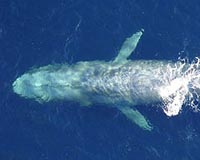| . |  |
. |
Rio De Janeiro (UPI) Jun 29, 2010 A global whaling deal is in disarray after the failure of international talks to reach a compromise that aimed to phase out hunting of the mammals. Observers who attended the 88-nation talks in Agadir, Morocco, said the collapse of the negotiations meant whale hunting could continue in a more disorderly and undisciplined manner than now. The International Whaling Commission pushed for a compromise deal that could allow some hunting under a quota system. Despite a global ban announced in 1986, Japan, Iceland and Norway continue killing whales. At least 1,500 were killed last year, most of them by crews on Japanese vessels, though some analysts said the numbers could be higher. Hunting nations use loopholes in the ban to continue with catches, citing scientific research as the reason for killing whales. In South America, previous bans on hunting have led to growth in whale stocks and promoted tourism focused on whale watching in Argentina, Brazil and Ecuador. The worst killings, however, continue in a southern region designated as a whale sanctuary. In addition to hunting, a further environmental threat to whales was highlighted when in May a dead sperm whale was found floating 77 miles south of the oil spill in the Gulf of Mexico. The discovery of the dead whale revived concerns about the future of whales in the southern waters. Latin American nations and the European Union sought an early end to hunting while U.S. negotiators pushed for a compromise that could save the talks. Faced with hardened positions in the EU and South America, the pro-hunting nations quickly moved away from a compromise. The failure means there is greater risk of less regulated whale-hunting than before the IWC congress, analysts said. Argentine representative Susana Ruiz Cerutti said the draft proposal didn't meet the needs of Latin American countries, which pushed for an early ban. She told the BBC the plan would have legitimized "scientific" whaling by Japan in the Southern Ocean and failed to specify substantial cuts in catches. U.S. commissioner Monica Medina said the breakdown was the fault of no particular party but other delegates blamed pro-hunting delegates. The divergence of views was highlighted when Japanese representative Yasue Funayama, a junior agriculture and fisheries minister, said she saw IWC as a "resource management organization. Opponents of the continuing hunt said they favored a stronger IWC playing the role of a conservation body. Anti-whaling delegates accused Japan of vote-buying in a bid to garner support for the Japanese position. Analysts said the collapse of the talks put into question IWC's future as a platform for negotiating workable deals. Although environmentalist groups hailed the failure of a compromise effort, moderate representatives who backed a compromise on lower catches by Japan, Iceland and Norway said the failure meant the group was headed for a more acrimonious future, with less possibility of whaling nations honoring the ban.
Share This Article With Planet Earth
Related Links Follow the Whaling Debate
 Whalewatching worth billions and booming: study
Whalewatching worth billions and booming: studyAgadir, Morocco (AFP) June 25, 2010 Whalewatching revenue topped two billion dollars in 2009 and could easily grow by 10 percent annually over the next few years, according to a new study. The first peer-reviewed assessment of whale tourism's global value boosts economic arguments that the marine mammals are worth more alive than dead, the researchers said. Published this week, the study coincides with a decision Thursday ... read more |
|
| The content herein, unless otherwise known to be public domain, are Copyright 1995-2010 - SpaceDaily. AFP and UPI Wire Stories are copyright Agence France-Presse and United Press International. ESA Portal Reports are copyright European Space Agency. All NASA sourced material is public domain. Additional copyrights may apply in whole or part to other bona fide parties. Advertising does not imply endorsement,agreement or approval of any opinions, statements or information provided by SpaceDaily on any Web page published or hosted by SpaceDaily. Privacy Statement |